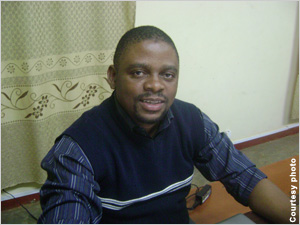
Washington — While still in his teens, Felix Limbani decided to help establish what he called “a platform where young people’s voices could be heard” in his native Malawi, where those aged 10–29 make up roughly 60 percent of the population.
There were relatively few youth-oriented groups in Malawi, Limbani said. “Young people were often seen as inexperienced, arrogant, lazy, ignorant, problematic and useless.” He wanted to change that perception and to encourage young people to take charge of their futures and help shape their country’s future, as well.
Young people contribute to the political, social and economic development of Malawi, he said, but “their contributions could be considerably greater” if increasing investments are made in education, health care and leadership training. Young people need to be given a voice in Malawi’s decisionmaking process and a role in solving the country’s problems, said Limbani.
As a secondary-school student, Limbani helped start Zomba Young Voices in his hometown of Zomba. He also got involved in YouthNet and Counselling (YONECO) and other community youth groups, and completed his bachelor’s degree in education at the University of Malawi. Now Limbani is YONECO’s director of programs.
Formed in 1997, YONECO is committed “to empowering youth, women and children, combating the spread of HIV infection, mitigating the impact of AIDS, and promoting democracy and human rights for socio-economic development,” according to its website. It is active in 14 of Malawi’s 28 districts.
Most young Africans “live under extreme poverty,” Limbani said. Of the 12 million young people (ages 15–24) living with HIV and AIDS worldwide, three-fourths are in sub-Saharan Africa, he said, and “women and young girls continue to be the most vulnerable” to HIV infection.
His organization works to help girls and young women, in particular. There are limited opportunities for girls to be educated “because the economic value of their work at home exceeds the perceived value of schooling,” said Limbani. As a result, “a lot of young women” experience teen pregnancy or resort to commercial sex work, he said.

The creation of a national toll-free help line for youth to report problems and get advice in Malawi is a particular source of pride for Limbani. It is supported by the government and coordinated by YONECO.”The help line is the first of its kind in the youth arena in Malawi,” he said. It lets young people “get answers to questions that they wanted to ask and never had the chance” to ask, questions on sexuality and HIV/AIDS, for example. Cases of child abuse are also reported. According to Limbani, the help line was able to prevent the marriages of five female children to older men.
“Our youth development program targets young people between the ages of 10 and 29,” Limbani said. “These are in- and out-of-school youth.” YONECO helps them get training in vocational and life skills, and leadership and community development, and also provides information on HIV/AIDS prevention, human rights and other critical issues. There are special programs aimed at promoting the rights of women and children.
Limbani’s work with young people was recognized by President Obama, who invited him to participate in the President’s Forum with Young African Leaders in 2010 in Washington. Being part of the forum was “a motivation to do more,” Limbani said.
He is studying for a master’s degree in public health and hopes his example will show young Africans that “education and knowledge are the only tools that can put them in a position of power to advocate for their rights.”
To learn more about YONECO, visit the organization’s website.
(This is a product of the Bureau of International Information Programs, U.S. Department of State. Web site: http://iipdigital.usembassy.gov/iipdigital-en/index.html)
??




No comments! Be the first commenter?